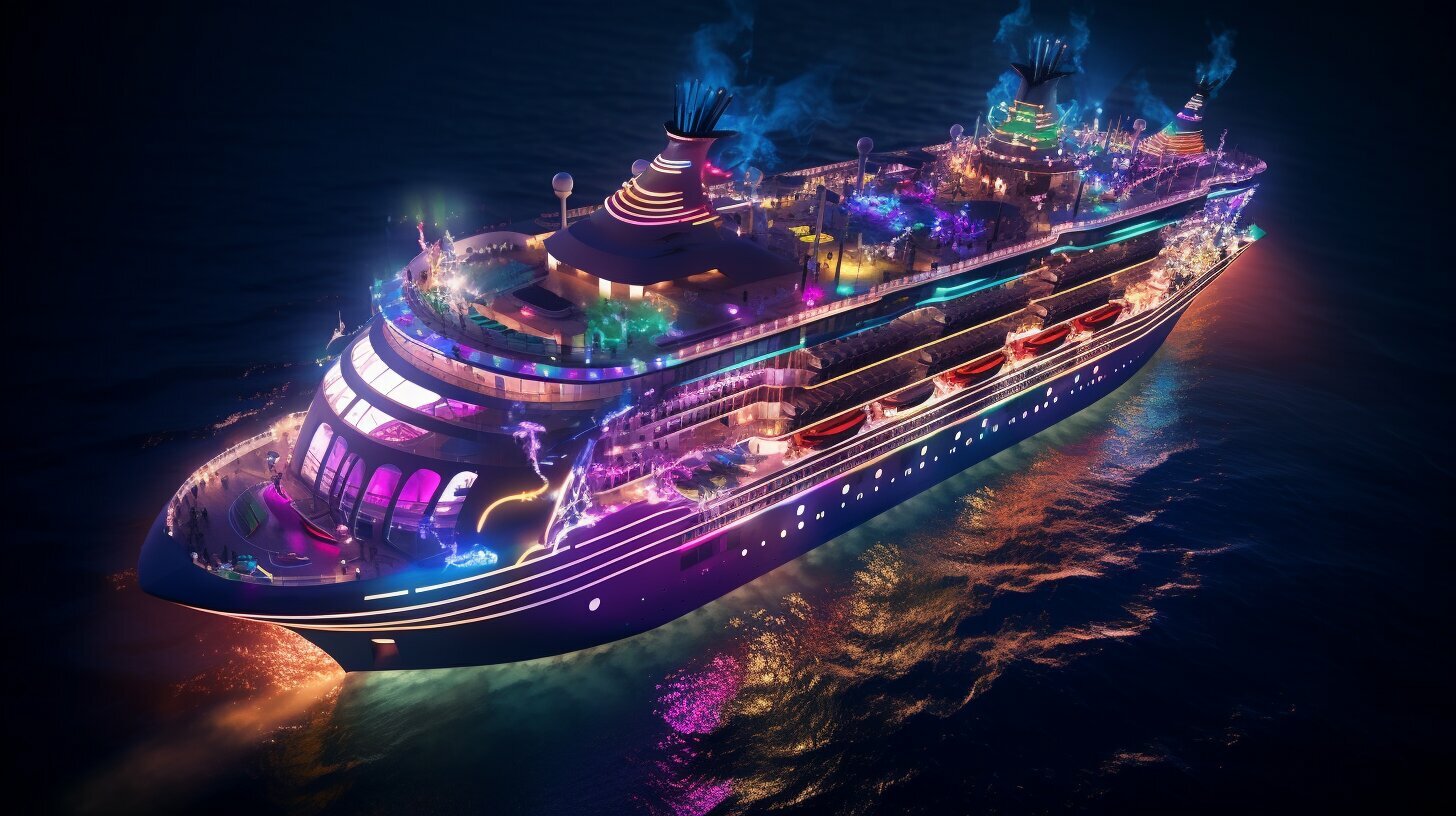Uncovering Why Do Casinos Have to Be on Water: A Guide
Have you ever wondered why casinos in the United States are typically situated on water? In this guide, I will explore the reasons behind this unique arrangement and shed light on the legal, regulatory, and economic factors that have shaped the landscape of water-based gambling. We’ll delve into the emergence of floating and riverboat casinos, the impact of gambling laws, and the influence of tribal sovereignty on the location of casinos on Native American lands. Join me as we uncover the fascinating world of casinos on water.
Key Takeaways:
- Many states in the United States have laws that restrict or regulate gambling activities, leading to the requirement for casinos to be located on water.
- Casinos on water, such as riverboats and barges, allow operators to navigate around legal restrictions and comply with gambling laws.
- The transition to water-based casinos was a strategic response to the complex landscape of gambling regulations and societal concerns.
- Riverboat casinos provided a regulated and controlled gambling environment, containing the geographic spread of casinos and addressing public sentiments.
- The Supreme Court ruling allowing casinos on Native American tribal lands opened up economic growth opportunities within the boundaries of tribal sovereignty.
The Legal and Regulatory Landscape of Casino Operations
To understand why casinos have to be on water, it’s important to explore the legal and regulatory landscape surrounding casino operations. In the United States, many states have laws that restrict or regulate gambling activities, making it challenging for casinos to operate. However, a loophole exists that allows casinos to set up shop on water, typically in the form of riverboats or barges. This unique arrangement allows casinos to navigate around certain legal restrictions and operate within the boundaries of the law.
This transition to water-based casinos was a calculated response to the complex landscape of gambling laws, shifting public sentiments, and economic ambitions. By positioning casinos on water, proponents were able to strike a delicate balance between addressing moral considerations surrounding widespread gambling and tapping into the potential economic opportunities that the industry presented.
In the early 1990s, the emergence of riverboat casinos marked a new chapter in the history of gambling. States such as Iowa, Mississippi, Missouri, Illinois, and Louisiana legalized riverboat gambling, providing a regulated and controlled environment for gambling activities. This approach allowed for the cultivation of a regulated gambling industry while containing the geographic spread of casinos. These riverboat casinos offered a novel form of entertainment that combined mobility, legal innovation, and controlled environments, attracting both locals and tourists.
| State | Year of Legalization |
|---|---|
| Iowa | 1989 |
| Mississippi | 1990 |
| Missouri | 1992 |
| Illinois | 1991 |
| Louisiana | 1990 |
Furthermore, the Supreme Court ruling that enabled casinos on Native American tribal lands provided further avenues for economic growth within the boundaries of tribal sovereignty. This decision not only expanded opportunities for Native American tribes but also contributed to the diversification of the casino industry in the United States.
The Impact of Casino Restrictions
The presence of casino restrictions in many states necessitated the innovative approach of having casinos on water. These restrictions, fueled by concerns about the societal implications of widespread gambling, created a climate where operating casinos on land became difficult. Waterborne casinos emerged as a solution to navigate these restrictions and satisfy the demands of both regulators and gambling enthusiasts.
“The transition to water-based casinos allowed for a regulated gambling industry while addressing the moral concerns surrounding widespread gambling.”
– Gambling Industry Expert
In summary, the decision to have casinos on water in the United States was driven by the legal and regulatory landscape, as well as the need to balance moral considerations and economic opportunities. Riverboat casinos provided a regulated and controlled environment for gambling, while the Supreme Court ruling enabled economic growth within Native American tribal lands. By understanding the legal and regulatory context, we can better comprehend why water-based gambling has become a prominent feature of the American casino industry.
The Rise of Floating and Riverboat Casinos
As gambling laws evolved, floating and riverboat casinos became a game-changer in the casino industry. These innovative establishments provided a unique and exciting way for people to experience gambling while complying with legal restrictions. By taking advantage of the water’s jurisdiction, casinos on riverboats and floating barges were able to navigate around the stringent regulations imposed by many states.
The concept of floating casinos emerged as a response to the complex landscape of gambling laws and shifting public sentiments. States such as Iowa, Mississippi, Missouri, Illinois, and Louisiana legalized riverboat gambling in the early 1990s, allowing for the cultivation of a regulated and controlled gambling industry. This approach enabled policymakers to strike a delicate balance between addressing moral concerns about widespread gambling and harnessing the economic potential of the casino industry.
“By positioning casinos on water, proponents were able to appease both those concerned about the societal implications of widespread gambling and those seeking economic prosperity.”
The introduction of floating and riverboat casinos revolutionized the gambling landscape by offering a novel form of entertainment that combined mobility, legal innovation, and controlled environments. It allowed for the establishment of casinos in areas where land-based gambling was heavily regulated or prohibited. These floating establishments not only provided an immersive gambling experience but also became popular tourist attractions, further boosting the local economy.
| State | Year of Legalization |
|---|---|
| Iowa | 1989 |
| Mississippi | 1990 |
| Missouri | 1992 |
| Illinois | 1991 |
| Louisiana | 1991 |
Table 1: Legalization of Riverboat Gambling in Select States.
Moreover, the Supreme Court ruling that allowed casinos on Native American tribal lands provided another avenue for economic growth within the boundaries of tribal sovereignty. This ruling not only created opportunities for Native American communities to generate revenue but also contributed to the overall expansion and diversification of the casino industry in the United States.
Conclusion
The rise of floating and riverboat casinos marked a significant turning point in the casino industry, allowing for the legal operation of gambling establishments in states with stringent regulations. By embracing the concept of water-based gambling, proponents were able to address both the moral concerns surrounding gambling and the economic ambitions of local communities. The continuous evolution of gambling laws, coupled with the ingenuity of the industry, has paved the way for innovative approaches to gambling that accommodate legal restrictions while providing an enjoyable and controlled environment for gamblers.
Navigating Legal Restrictions and Economic Ambitions
The transition to water-based casinos was a strategic move to navigate legal restrictions and fulfill economic ambitions. In the United States, many states have laws in place that restrict or regulate gambling activities. However, some of these states allow casinos to operate if they are located on water. This unique arrangement, typically in the form of riverboats or barges, enables casinos to operate within the boundaries of the law while offering entertainment to patrons.
This decision was not made haphazardly. It was a calculated response to the complex landscape of gambling laws, shifting public sentiments, and economic considerations. By positioning casinos on water, proponents were able to address the concerns of those worried about the societal implications of widespread gambling while also stimulating economic growth.
The emergence of riverboat casinos in the early 1990s marked a new chapter in the history of gambling in the United States. These floating establishments provided a novel form of entertainment that combined mobility, legal innovation, and controlled environments. The legalization of riverboat gambling in states like Iowa, Mississippi, Missouri, Illinois, and Louisiana created a regulated gambling industry while also containing the geographic spread of casinos.
| State | Riverboat Casinos | Year Legalized |
|---|---|---|
| Iowa | 18 | 1989 |
| Mississippi | 29 | 1990 |
| Missouri | 13 | 1992 |
| Illinois | 10 | 1991 |
| Louisiana | 15 | 1991 |
Furthermore, the Supreme Court ruling that allowed casinos on Native American tribal lands provided additional opportunities for economic growth within the bounds of tribal sovereignty. This decision opened up avenues for tribes to establish and operate casinos, boosting the local economy and creating jobs.
The Impact of Water-Based Gambling
- Water-based casinos enable operators to navigate legal restrictions on gambling activities.
- By locating casinos on water, proponents were able to address societal concerns while driving economic growth.
- Riverboat casinos introduced a new form of entertainment that combined mobility, legal innovation, and controlled environments.
- The legalization of riverboat gambling in certain states created a regulated industry and contained the geographic spread of casinos.
- The Supreme Court ruling that allowed casinos on Native American tribal lands provided further economic opportunities within the bounds of tribal sovereignty.
References:
- State of Iowa – Department of Inspections & Appeals: http://www.iowa.gov/inspect/doi/Regulated\_Industries/Campaign\_to\_Stop\_Underage\_Gambling\_click_here.html
- Gulf Coast Gaming Association: http://www.gulfcoastgaming.net/
| State | Riverboat Casinos | Year Legalized |
|---|---|---|
| Iowa | 18 | 1989 |
| Mississippi | 29 | 1990 |
| Missouri | 13 | 1992 |
| Illinois | 10 | 1991 |
| Louisiana | 15 | 1991 |
The Impact of Riverboat Casinos on the Gambling Industry
Riverboat casinos brought about a new era in the gambling industry, offering a unique blend of mobility, legal innovation, and controlled environments. These floating gambling establishments emerged as a response to the complex legal landscape surrounding casinos in the United States. By taking their operations onto the water, they were able to navigate around certain legal restrictions and provide a regulated gambling experience.
The legalization of riverboat gambling in states like Iowa, Mississippi, Missouri, Illinois, and Louisiana revolutionized the gambling industry. It allowed for the cultivation of a regulated gambling environment while containing the geographic spread of casinos. Riverboat casinos were designed to be mobile, allowing them to travel along rivers or be moored at specific locations, providing a variety of gaming options to a broader audience. This mobility offered a unique experience for gamblers, enabling them to explore different destinations while enjoying their favorite casino games.
The controlled environment of riverboat casinos also contributed to their popularity. These floating establishments provided a regulated setting where gambling activities could take place under the watchful eye of authorities. Additionally, the limited space and confines of a riverboat casino created a more intimate atmosphere, appealing to those seeking a more exclusive and personalized gaming experience.
In summary, the advent of riverboat casinos had a significant impact on the gambling industry. They provided a solution to the complex legal landscape surrounding casinos in the United States and offered a novel form of entertainment that combined mobility, legal innovation, and controlled environments. By allowing casinos to operate on water, states were able to regulate gambling activities while also addressing concerns about the geographic spread of casinos. The legacy of riverboat casinos lives on, as they remain a unique and cherished aspect of the American gambling landscape.
Table: States Allowing Riverboat Gambling
| State | Date of Legalization |
|---|---|
| Iowa | 1989 |
| Mississippi | 1990 |
| Missouri | 1991 |
| Illinois | 1991 |
| Louisiana | 1992 |
Tribal Sovereignty and Casinos on Native American Lands
The legalization of casinos on Native American tribal lands provided a significant boost to economic growth and expanded the range of gambling opportunities. This landmark decision by the Supreme Court recognized the sovereignty of Native American tribes and their right to operate casinos on their own lands. It marked a turning point in the gambling industry, creating new avenues for economic prosperity and cultural preservation.
Native American tribes across the United States have leveraged this opportunity to develop thriving casino resorts that attract tourists and generate revenue. These casinos have become important economic engines for many tribes, creating jobs, funding social programs, and supporting local communities. The revenue generated from these establishments has helped to improve infrastructure, healthcare, education, and other essential services for tribal members.
Furthermore, the establishment of casinos on tribal lands has provided Native American communities with a means to preserve their cultural heritage. Many of these casinos incorporate traditional elements of Native American culture, offering visitors a unique and immersive experience. From tribal artwork and architecture to traditional cuisine and entertainment, these casinos serve as a showcase of Native American heritage, contributing to the cultural diversity of the American gambling industry.
Overall, the legalization of casinos on Native American tribal lands has been a win-win situation for both the Native American tribes and the surrounding communities. It has offered tribes a pathway to economic self-sufficiency and cultural preservation, while also providing visitors with a distinctive and enriching gambling experience. The success of these tribal casinos underscores the importance of recognizing tribal sovereignty and supporting the economic growth of Native American communities.
| Tribal Casinos Benefits | Impacts |
|---|---|
| Job creation | Provides employment opportunities for tribal members and surrounding communities. |
| Economic growth | Generates revenue for tribal governments, supporting social programs and community development. |
| Tourism attraction | Brings visitors to tribal lands, contributing to the local economy and cultural exchange. |
| Cultural preservation | Allows tribes to showcase and preserve their cultural heritage through the incorporation of traditional elements in casino resorts. |
| Community support | Enables tribes to invest in infrastructure, healthcare, education, and other vital services for tribal members and neighboring communities. |
Conclusion
The decision to have casinos on water in the United States arose from a delicate balance between legal restrictions, economic opportunities, and the evolution of gambling laws. Factual data reveals that many states have laws that restrict or regulate gambling activities, making it challenging for casinos to operate on land. However, these laws often allow for casinos to be located on water, giving rise to the concept of water-based gambling.
The transition to floating and riverboat casinos was a calculated response to the complex landscape of gambling laws and shifting public sentiments. By positioning casinos on water, proponents were able to navigate around certain legal restrictions while still operating within the boundaries of the law. This innovative approach to casino operations not only addressed concerns about the societal implications of widespread gambling but also provided economic opportunities for both the casino industry and the local communities.
Riverboat casinos, which emerged in the early 1990s, played a significant role in the evolution of the gambling industry. With the legalization of riverboat gambling in several states such as Iowa, Mississippi, Missouri, Illinois, and Louisiana, a regulated and controlled environment was established. This allowed for the cultivation of a thriving gambling industry while containing the geographic spread of casinos. The mobility and novelty of riverboat casinos added a unique dimension to the gambling experience, attracting both local residents and tourists.
Furthermore, the Supreme Court ruling that enabled casinos on Native American tribal lands further expanded the opportunities for economic growth within the boundaries of tribal sovereignty. This ruling opened up avenues for Native American tribes to generate revenue and create jobs through the establishment of casinos on their lands. Not only did this decision benefit the tribes themselves, but it also contributed to the overall growth and diversity of the gambling industry in the United States.
In conclusion, the decision to have casinos on water in the United States was driven by a delicate balance between legal restrictions, economic opportunities, and the evolution of gambling laws. This innovative approach addressed both moral considerations and the desire for economic prosperity. The emergence of floating and riverboat casinos, along with the establishment of casinos on Native American tribal lands, ushered in a new era in the gambling industry, providing regulated and controlled environments for gambling while contributing to economic growth.
FAQ
Why are casinos in the United States often located on water?
Casinos in the United States are often located on water due to legal and regulatory reasons. Many states have laws that restrict or regulate gambling activities, but they may allow casinos to operate if they are situated on water, typically in the form of riverboats or barges. This arrangement allows casinos to navigate around certain legal restrictions and operate within the boundaries of the law.
How did the transition to water-based casinos come about?
The transition to water-based casinos was a calculated response to the complex landscape of gambling laws, shifting public sentiments, and economic ambitions. By positioning casinos on water, proponents were able to appease both those concerned about the societal implications of widespread gambling and those seeking economic prosperity. The emergence of riverboat casinos in the early 1990s sparked a new chapter in gambling history, providing a novel form of entertainment that combined mobility, legal innovation, and controlled environments.
Which states have legalized riverboat gambling?
States such as Iowa, Mississippi, Missouri, Illinois, and Louisiana have legalized riverboat gambling, allowing for the cultivation of a regulated gambling industry while containing the geographic spread of casinos.
How did the Supreme Court ruling impact casinos on Native American tribal lands?
The Supreme Court ruling enabled casinos on Native American tribal lands, providing further avenues for economic growth within the boundaries of tribal sovereignty. This ruling allowed Native American tribes to operate casinos and generate revenue within their territories, contributing to their economic development.
Why is balancing moral considerations and economic opportunities important in casino location choices?
The decision to have casinos on water in the United States arose from a delicate balance between moral considerations, economic opportunities, and the evolution of gambling laws. By addressing both the concerns regarding the societal implications of widespread gambling and the desire for economic prosperity, the water-based casino approach sought to find a middle ground that appeased both sides.
- Discovering Why Do Women Wear Lipstick: A Deeper Look - 19/12/2023
- Why Do Golfers Only Wear One Glove? - 16/12/2023
- Why Don’t Hobbits Wear Shoes? - 14/12/2023
Hi, I’m Rhiannon, the lead author behind The News Wire. As a passionate journalist, I strive to bring you the latest news and updates from all over the world. With a keen eye for detail and a dedication to unbiased reporting, I aim to deliver well-researched and informative articles that keep you informed and engaged. From breaking news to in-depth analyses, I cover a wide range of topics with the aim of keeping you in the loop. Join me on The News Wire as we explore the dynamic and ever-changing landscapes of global events, uncovering the stories that matter most.






